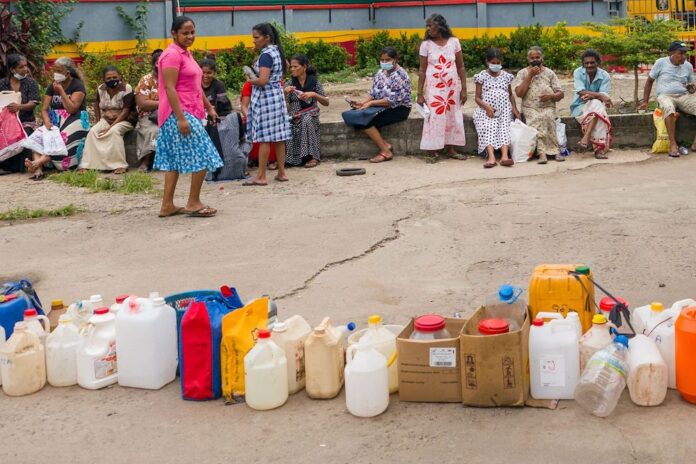COLOMBO: Sri Lanka’s Ministry of Education ordered on Saturday the closure of schools in Colombo for the next week, as the island nation grapples with an acute fuel shortage that has ground transportation across the country almost to a halt.
Sri Lanka, facing its worst economic crisis since gaining independence in 1948, has lacked the foreign currency to finance the import of essential goods, including food, medicines and fuel, since late last year. The country’s existing stock of petrol and diesel is projected to run out in days.
The nation of 22 million people defaulted on a multimillion-dollar foreign debt payment last month, as inflation reached almost 40 percent. Long queues of people outside fuel stations are now a common sight, with many having waited for days to fill up their vehicles.
As the economic turmoil worsens, the Ministry of Education has announced that schools in the capital were to close for at least one week, citing “the transportation difficulties owing to the current fuel crisis.
“The Ministry of Education states that all government and government-approved private schools in Colombo city limits will remain closed for the next week,” a circular issued by the ministry reads.
Online education is to replace in-school learning for the time being, with authorities in the education sector scheduled to meet next Saturday to decide on the continuation of academic activities.
The announcement comes after the public administration ministry ordered on Friday the shutdown of government offices and schools across the country due to the fuel shortage. Earlier this week, the government had approved a four-day work week for public sector workers in a bid to conserve fuel.
The Ministry of Education said that schools outside Colombo, where transportation issues are not as prominent as in the capital, will continue in person.
Teachers in the capital said that students are losing an essential part of their education experience, while some raised concerns that some students may not be able to access virtual education.
“They are talking of online classes — how many children can afford this scheme? The smartphones and laptops are so costly, which makes them a distant dream,” Mohammed Nizar Mohamed, a master teacher formerly employed by the Ministry of Education, told Arab News.
Mohamed said that children in Sri Lanka have been psychologically impacted by a series of events that occurred in the last few years, including the COVID-19 pandemic and the Easter Sunday bombings in 2019. The deepening economic crisis and its impact on the education sector “adds fuel to the fire,” he said.
“The poor children, who are the future generation of our nation, have got caught innocently in this cycle,” M.S.M. Suhar, principal at Al-Meelad High School in Dehiwela, told Arab News.
“Children learn a lot from attending school daily. If that is lost, a major part of their school career which gives a variety of childhood experiences is lost,” Suhar said.
Nasriya Munas, principal of Muslim Ladies College in Colombo, said that even though lessons can also be conducted virtually, “classroom education is only a part of their school experience.
“But social interaction, the student-teacher relationship and the school environment cannot be enjoyed by the students,” Munas told Arab News.

